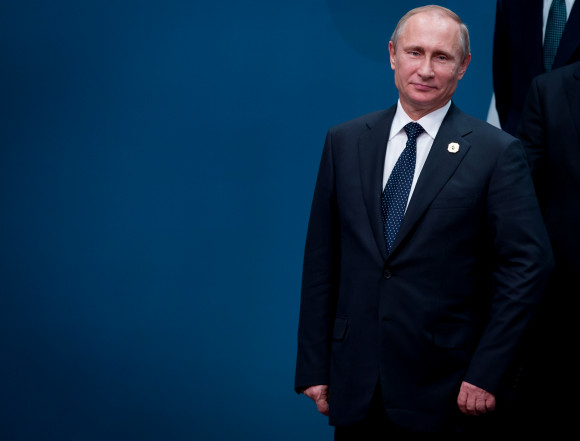Russian companies face billions of dollars in extra insurance costs as Western sanctions prompt foreign insurance firms to start pulling out, worried that any business they undertake is at risk from future measures and an increasingly sick economy.
Russian President Vladimir Putin came under heavy criticism at a G20 summit last weekend, where Western leaders accused him of continuing to destabilize Ukraine in violation of a September peace agreement.
Existing sanctions, along with an oil price tumble, have brought Russia to the brink of recession. The ruble is down some 30 percent over the year and lending costs are soaring for all companies, be they on sanctions lists or not. That has led foreign insurers to conclude that it’s simply not worth the risk of offering their services, say industry sources.
“There is a concern that further sanctions could be imposed (and) there is uncertainty about where they might be imposed,” said Andrew van den Born at insurance broker Willis.
“If (insurance companies) were to write credit risk for Russia – even if the companies are not sanctioned – and they were to default, they would have a difficult conversation as to why they chose to write the risk.”
Russian companies are likely to be hit in several ways.
Domestic insurers will struggle to find foreign reinsurers to share the cost of insuring Russian energy or shipping projects – for example – which in turn will put increased financial pressure on those projects to find far more money for coverage.
Secondly, in the credit market, Western bankers will be reluctant to lend to Russian companies because those firms now cannot get insurance against the risk of defaulting on their loans.
“While certain Russian entities can insure a certain amount of risk in the Russian market, they need to get re-insurance from the world market and that is an area where difficulties are created currently for Russian companies,” said Michael Kingston of law firm DWF who works with insurance companies on Arctic operations.
One industry source said Russian insurance business worth at least $3 billion – including oil and gas assets – was shared out through reinsurers via specialist provider Lloyd’s of London alone, and this was in danger of drying up.
A Lloyd’s market spokesman said it complied with all international sanctions and declined further comments.
Participants in the global credit risk market are based everywhere from London to New York, Bermuda and Singapore and may be exposed to up to $15 billion of Russian loans, van den Born said.
Peter Jenkins, co-head of political and credit risk at Brit – one of several specialist underwriters with a presence in the Lloyd’s of London market – said: “I would suspect for many (credit risk) players, Russian-related income will have represented between 10 and 25 percent of their income.”
FILLING THE GAP
Moscow is already under pressure to secure financing for critical oil and gas projects including in the remote parts of the Arctic, as Western lenders pull out.
Russian insurers may follow the example set by sanctioned oil firms like Novatek that are talking to Chinese lenders in an attempt to fund future projects.
Three Western insurance sources looking at the current situation say Russian energy insurer SOGAZ – one of the country’s biggest specialist insurers – is among the domestic insurers likely to find it harder to re-insure its risk in markets like London and New York.
“For U.S. insurers in general, I suspect there is some caution with respect to SOGAZ, which is so far as I am aware not itself a sanctioned entity,” said Thomas Dawson, partner at the insurance arm of law firm Drinker Biddle in New York.
SOGAZ First Deputy Chief Executive Nikolai Galushin told Reuters it had not experienced any reinsurers refusing to deal with the company, but added the company was diversifying its reinsurance providers by “deepening ties with emerging markets.”
Galushin said the company had already faced cases where Russian firms on sanctions lists were refused reinsurance from Western markets, forcing them to look for alternative cover for those firms.
Alexei Savelyev, head of the reinsurance department at Russian insurer Ingosstrakh, said the company had been notified by one U.S. firm that it planned to quit the Russian market, though he added that London-based insurers were not so far signaling “any restrictions in operations.”
Those participants that are still willing to insure Russian companies are likely to at least double their prices to reflect the risk now involved, underwriters say.
“There is going to be a shortage of the ‘right’ Russian business,” said Bernie de Haldevang of Aspen Insurance. “There will be much less attractive business than before.”
(Editing by Sophie Walker)
Topics Carriers New York Energy Oil Gas Reinsurance Russia London
Was this article valuable?
Here are more articles you may enjoy.



 Insurance Broker Stocks Sink as AI App Sparks Disruption Fears
Insurance Broker Stocks Sink as AI App Sparks Disruption Fears  Lemonade Books Q4 Net Loss of $21.7M as Customer Count Grows
Lemonade Books Q4 Net Loss of $21.7M as Customer Count Grows  US Supreme Court Rejects Trump’s Global Tariffs
US Supreme Court Rejects Trump’s Global Tariffs  AIG’s Zaffino: Outcomes From AI Use Went From ‘Aspirational’ to ‘Beyond Expectations’
AIG’s Zaffino: Outcomes From AI Use Went From ‘Aspirational’ to ‘Beyond Expectations’ 

